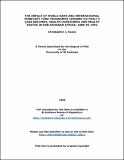The impact of World Bank and International Monetary Fund programme lending on health care delivery, health conditions and health status in sub-Saharan Africa, 1980 to 1992
Abstract
The World Bank and the International Monetary Fund have been active in Africa for
several decades. In the early 1980s both institutions expanded the role that they play
in the restructuring of African economies through the introduction of structural
adjustment loans. These programme loans sought to provide the basis for sustainable
economic expansion following a period of near economic collapse in the region. In
the case of the Fund, public expenditure reducing and expenditure switching policies
were encouraged. The Bank, also, was active in these areas and focused on long-term
measures to restore efficiency to the ailing economies. These policies, although not
novel, were implemented on a large scale were perceived to have a pervasive
influence on the economic and social performance of African countries.
It was theorised by some that such programme lending would have a long-run
beneficial impact on social development. However, other authors, observers and
researchers have criticised the activities of the Bretton Woods institutions. First, the
loans have been heavily criticised in the past for the supposedly heavy handed nature
that Bank and Fund staff use in implementing their programmes. The main idea is
that the institutions have too much leverage when bargaining with African
governments to undertake reforms. Second, it has been said that the use of
programme loans will have adverse consequences for national welfare. UNICEF, the
main critic, has pointed out, and provided evidence, to indicate that vulnerable groups
in society may suffer under adjustment schemes.
This thesis looks at the areas of macroeconomic reforms and the impact that
they may have on one part of the social area: the health sector. The thesis examines
the pre-adjustment situation in Sub Saharan Africa and reviews the role and the tools
that the Bank and the Fund have at their disposal to tackle economic problems. The
thesis then moves on to explore the linkages between these policy weapons and
changes in health care development. In order to fully understand the implications for
Africa considerable attention is devoted to exploring the health problems that the
region faces and the health care delivery systems and health conditions that are
prevalent in many of the countries. The last part of the thesis provides an aggregate
study and a case study analysis of the impact of adjustment in Africa. Although, it is
determined that the impact, overall, has not been unfavourable, recommendations for
the future design of adjustment programmes is offered in the conclusion.
Type
Thesis, PhD Doctor of Philosophy
Collections
Items in the St Andrews Research Repository are protected by copyright, with all rights reserved, unless otherwise indicated.

